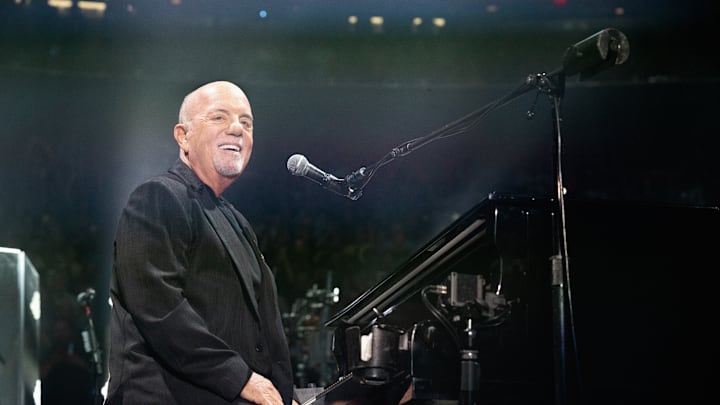The documentary Billy Joel: And So It Goes is a fascinating deep dive into the legendary singer’s life. The two-part series can be streamed on HBO Max and is about five hours long in its entirety.
Five hours may seem like a lot, but many documentaries can leave a viewer feeling unsatisfied, as if the topic wasn’t explored as thoroughly as it should have been. That is not the case with And So It Goes.
Part one flew by as it gave the audience an in-depth look into his troubled childhood, with an absentee father and an undiagnosed bipolar mother. As his life’s story unfolded, it was clear these early years influenced him as he grew into adulthood.
Part one of Billy Joel: And So It Goes explores personal and career decisions
Not only did part one delve into his childhood, but it also explored how his music career developed early on. To his credit, Joel was open about the mistakes he made in those years, both professionally and in his personal life. He revealed how some of his mistakes led to two early suicide attempts.
Joel experimented musically early on, including a humorous attempt at forming a heavy metal band (without a guitarist). That obviously did not work out for him, but things have worked out well for him in the end.
Audiences are treated to the story that led to what is arguably his signature song, “The Piano Man.” It was based on real experiences he had in Los Angeles while in a dispute with a record company. Ironically, because of a bad record deal he made early in his career, he’s made very little money from his most famous tune.
Part one followed Joel through the Seventies as his fame and record sales grew, and how he emerged from the crowded music scene as a hit-maker and Grammy winner.
He produces several albums in a row that are both commercially successful and critically acclaimed. Some of Joel's best work is on albums like The Stranger (1977) and 52nd Street (1978). With these records, he became the superstar we recognize today.
Part two of Billy Joel: And So It Goes is slower-paced but still fascinating
With Joel’s Album Glass Houses, he solidifies himself as not only a singer/songwriter, but also as a bona fide rock star. Part two follows his career from that point in his career to what he is doing now.
From the amusing story of how he meant Christie Brinkley to how that relationship and his subsequent marriages played out. Joel doesn’t dodge his culpability in the failure of his marriages or the fact that he had a severe alcohol problem for much of his career.
The one thing Joel and the documentary do not dig in very deep on is Joel’s drug use. It is mentioned a couple of times, but is glossed over. Joel is undoubtedly entitled to keeping some secrets about his life to himself, but he was so open about everything else. It could also be that his drug use was not a big issue. It just felt like that one topic was avoided.
One topic that is addressed head-on is his family history. Joel was eight years old when his father left, and that impacted Joel. When he gained the means to do so, he started a search to find his dad. His father was tracked down eventually in Vienna, Austria, and Joel finds out he has a younger half-brother. Despite reconnecting with his father, the two never completely repair their relationship as father and son, and it is a lasting regret and tragedy for Joel.
Joel continued to make new music and produce hits into the Nineties, but at one point, the pressure of matching his previous successes, let alone exceeding them, took a toll, and he set aside the songwriting aspect of his career. He concentrated on touring, something at which he had always been successful.
The documentary explored the years in which he toured with Sir Elton John and the success of their partnership. Still, it also highlighted issues between the two superstars, which seemed to be centered around Joel’s excessive drinking.
Part two lags at times in ways part one never did, but the overall story remained interesting. For instance, did you know Joel composed a classical music album that was very successful? Fantasies and Delusions was released in 2001 and was his last studio album.
Because Joel didn’t feel accomplished enough as a pianist (he is the Piano Man) to play on the album. Richard Hyung-ki Joo was featured on the record. The album was Joel’s 19th to chart on the Billboard 200 album chart, and it reached the top of the classic album chart.
This album was a tribute to the music he grew up listening to. Both of his parents listened to classical music in his early youth, and his half-brother is a professional orchestral conductor. Classic music played a big part in his life.
The show winds down with a look at his life now. He’s on his fourth wife, and has two young daughters in addition to the daughter he had with Brinkley. He’s playing again and recently made his 100th straight sellout at Madison Square Garden. He seems happy in his own skin for maybe the first time in his life. He looked to be at peace with where his life has taken him.
Billy Joel: And So It Goes is a tremendous documentary. For Billy Joel fans, it is a must-watch, and it would be entertaining for most music fans. Appreciate it for the detail it goes into, and it does not leave audiences wishing for more. Joel came off as open and honest in almost all things, and he didn’t hide from the mistakes he made throughout his life.
It is well worth the five-hour commitment. You won’t regret getting to know the legend better.
